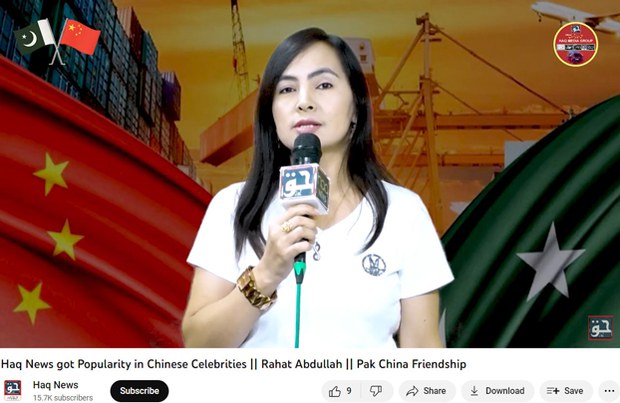“Chinese Rahat Abdullah” has become a regular on Pakistani social media channels, YouTube, and Facebook, wearing Atlas silk dresses, Pakistani clothing, or traditional Chinese outfits.
Regarded as a Chinese internet star, she also sings in Urdu on local radio and cooks Uyghur dishes on Pakistani TV programs – though she refers to the dishes as Chinese food.
Her sudden rise in popularity has raised questions among Uyghurs living in Pakistan about Beijing’s efforts to use local Uyghurs as pro-Chinese Communist Party propaganda tools to downplay the Chinese government’s horrific treatment of Uyghur Muslims in Xinjiang.
China has come under harsh international criticism for its severe rights abuses against the predominantly Muslim Uyghurs, including forced labor. The U.S. government and several Western parliaments have declared that the abuses amount to genocide or crimes against humanity.
Abdullah is believed to hail from the city of Ghulja – or Yining in Chinese – in Xinjiang. Information on Pakistani social media platforms says she earned a law degree in China and arrived in Pakistan in 2010.
She has been known to teach Chinese at various universities in Pakistan and is portrayed in the videos as a messenger of friendship between China and predominantly Muslim Pakistan.
But Abdullah doesn’t mix with local Uyghurs, according to Omar Uyghur, the founder of a trust that provides assistance to Uyghur refugees in Pakistan.
“She doesn’t come to the weddings or funerals,” he said. “Uyghurs don’t meet with her either. She spreads propaganda in the Pakistani media on how Uyghurs are living happily.”
At a time when Uyghurs in Pakistan cannot freely return to Xinjiang and some Uyghur women married to Pakistanis are being detained by Chinese authorities in the region, Abdullah was able to visit Ghulja last June.
During her visit, she participated in a wedding and recorded Uyghur songs and dances there, later posting them on Facebook and other social media platforms to give her Pakistani followers the impression that Uyghurs live happy lives.
Television host and actress
Until recently, Abdullah had about 10 social media followers, but her follower count has climbed to more than 40,000, largely due to her appearances on Pakistani TV.
She recently became a host of the “Ni Hao” program – Mandarin for “Hello” – on Pakistan’s Kay2 TV, a channel that has received investment from China. She also has portrayed a Pakistani woman married to a Chinese man in a TV series that highlights the friendship between China and Pakistan.
On June 4, Abdullah sang a Pakistani folk song on an Eid al-Adha TV program in Islamabad while wearing a traditional Uyghur Atlas dress and introducing herself as “Chinese Rahat Abdullah.”
Photos on her social media accounts indicate that she has had connections with the Chinese Embassy in Pakistan and other Chinese organizations there since 2017.
Abdullah, who is relatively unfamiliar to Uyghurs but is gaining popularity through local broadcasts in Pakistan, did not respond to Radio Free Asia’s requests for comment via messages sent to her social media accounts.
Other efforts with Pakistanis
Abdullah’s new notoriety comes as China and Pakistan have strengthened ties across various sectors in recent years, and as Beijing has invited some influential Pakistanis on trips to Xinjiang.
On July 18, Ma Xingrui, Communist Party Secretary of the Xinjiang Uyghur Autonomous Region, and Xinjiang government chairman Erkin Tuniyaz welcomed a delegation of Pakistani scholars in Urumqi, Xinjiang’s capital.
During the meeting, Ma told his guests that they have created a free and happy living environment for the people of Xinjiang. He also criticized Western countries that have followed the lead of the United States in condemning China for human rights violations.
Alleged atrocities against the Uyghurs have included detention in “re-education” camps and prisons, torture, sexual assaults, and forced labor.
Qibla Ayaz, chairman of Pakistan’s Council of Islamic Ideology and leader of the visiting delegation, affirmed the participants’ unwavering support for China and expressed admiration for the progress in Xinjiang’s development and the peaceful lives of its Muslim population.
The participants also expressed hopes for creating closer connections with Xinjiang through the Pakistan-China Economic Corridor, a 3,000-kilometer Chinese infrastructure network project under the Belt and Road Initiative to secure and reduce travel time for China’s Middle East energy imports.
An ineffective measure
Some Pakistanis have expressed growing concern that their government has remained silent about the abuses in Xinjiang.
Pakistani scholar Muhammad Usman Asad, who has spoken out on behalf of Uyghurs in Xinjiang, said when China invites Pakistani religious scholars to tour Xinjiang, news about their visits always appears on Chinese social media, but not in the Pakistani media.
“These so-called religious scholars are not the kind of scholars that the Muslim masses in Pakistan would listen to,” said Asad, who staged a solitary sit-in in Islamabad in June 2022 to protest China’s repressive policies against Uyghurs. “They are only pro-government and government-sponsored Islamist organizations, so their false propaganda about China will have little effect.”
Nonetheless, China is extending its attempts to sanitize its image, Asad said, following heavy criticism from Western nations about the government’s brutal treatment of Uyghurs and other Turkic minorities in Xinjiang.
“Just as China’s campaign to improve its image through the religious sphere has been ineffective, its campaign in Pakistan through English-speaking Chinese or Pakistani internet stars has been equally ineffective,” he said.
